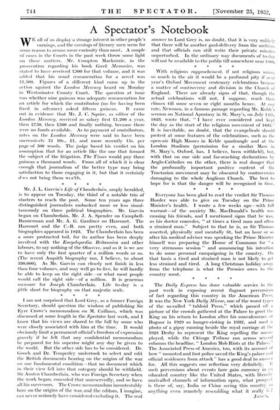I am not surprised that Lord Grey, as a former
Foreign Secretary, should question the wisdom of publishing Sir Eyre Crowe's memorandum on M. Caillaux, which was discussed. at some length in the Spectator last week, and I know that his views are shared to the full by some who were closely associated with him at the time. It would obviously limit a permanent official's freedom of expression gravely if he felt that any confidential memorandum he prepared for his superior might any day be given to the world. But the other side has to be considered. Dr. Gooch and Dr. Temperley undertook to select and edit the British documents bearing on the origins of the war on one fundamental condition—that no document which in their view fell into that category should be withheld. Sir Austen Chamberlain, who was Foreign Secretary when the work began, conceded that unreservedly, and so have all his successors. The Crowe memorandum incontestably bore on the origins of the war, and the editors, I imagine, can never seriously have considered excluding it. The real answer to Lord Grey is, no doubt, that it is very unlikely that there will be another gaol-delivery from the archives and that officials can still write their private minutes unperturbed. In -the ordinary way documents of to-day will not be available to the public till somewhere near 1980,






































 Previous page
Previous page